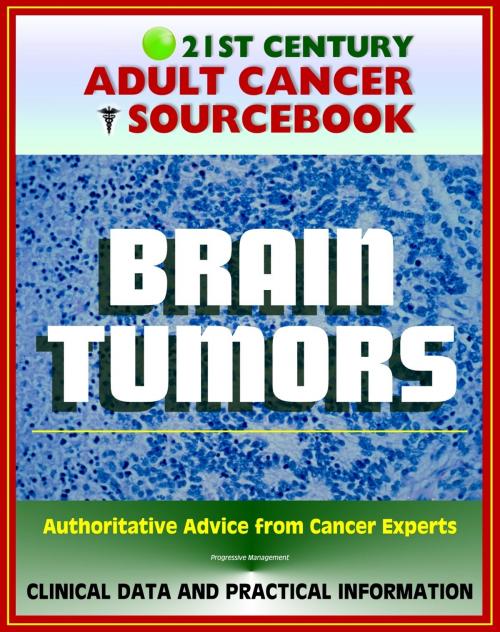21st Century Adult Cancer Sourcebook: Adult Brain Tumors - Primary Malignant Tumors, Glioma, Astrocytoma, Meningioma, Oligodendroglioma, Ependymoma, Glioblastoma
Nonfiction, Health & Well Being, Health, Ailments & Diseases, Cancer, Medical| Author: | Progressive Management | ISBN: | 9781466016835 |
| Publisher: | Progressive Management | Publication: | September 24, 2011 |
| Imprint: | Smashwords Edition | Language: | English |
| Author: | Progressive Management |
| ISBN: | 9781466016835 |
| Publisher: | Progressive Management |
| Publication: | September 24, 2011 |
| Imprint: | Smashwords Edition |
| Language: | English |
Authoritative information and practical advice from the nation's cancer experts about adult brain tumors includes official medical data on signs, symptoms, treatment options, surgery, radiation, drugs, chemotherapy, staging, biology, prognosis, and survival, with a complete glossary of technical medical terms and current references. Starting with the basics, and advancing to detailed patient-oriented and physician-quality information, this comprehensive in-depth compilation gives empowered patients, families, caregivers, nurses, and physicians the knowledge they need to understand the diagnosis and treatment of brain cancer - covering gliomas, astrocytomas, meningiomas, oligodendrogliomas, ependymomas, glioblastomas, and many others.
Comprehensive data on clinical trials related to brain tumors is included - with information on intervention, sponsor, gender, age group, trial phase, number of enrolled patients, funding source, study type, study design, NCT identification number and other IDs, first received date, start date, completion date, primary completion date, last updated date, last verified date, associated acronym, and outcome measures.
The clinical presentation of various brain tumors is best appreciated by considering the relationship of signs and symptoms to anatomy. General signs and symptoms include headaches; gastrointestinal symptoms such as nausea, loss of appetite, and vomiting; and changes in personality, mood, mental capacity, and concentration. Whether primary, metastatic, malignant, or benign, brain tumors must be differentiated from other space-occupying lesions such as abscesses, arteriovenous malformations, and infarction, which can have a similar clinical presentation. Other clinical presentations of brain tumors include focal cerebral syndromes such as seizures. Seizures are a presenting symptom in approximately 20% of patients with supratentorial brain tumors and may antedate the clinical diagnosis by months to years in patients with slow-growing tumors. Of all patients with brain tumors, 70% with primary parenchymal tumors and 40% with metastatic brain tumors develop seizures at some time during the clinical course.
Extensive supplements, with chapters gathered from our Cancer Toolkit series and other reports, cover a broad range of cancer topics useful to cancer patients. This edition includes our exclusive Guide to Leading Medical Websites with updated links to 81 of the best sites for medical information, which let you quickly check for updates from the government and the best commercial portals, news sites, reference/textbook/non-commercial portals, and health organizations. Supplemental coverage includes:
Levels of Evidence for Cancer Treatment Studies
Glossary of Clinical Trial Terms
Clinical Trials Background Information and In-Depth Program
Clinical Trials at NIH
How To Find A Cancer Treatment Trial: A Ten-Step Guide
Taking Part in Cancer Treatment Research Studies
Access to Investigational Drugs
Clinical Trials Conducted by the National Cancer Institute's Center for Cancer Research at the National Institutes of Health Clinical Center
Taking Time: Support for People with Cancer
Facing Forward - Life After Cancer Treatment
Chemotherapy and You
This is a privately authored news service and educational publication of Progressive Management. For over a quarter of a century, our news, educational, technical, scientific, and medical publications have made unique and valuable references accessible to all people. Our e-books put knowledge at your fingertips, and an expert in your pocket!
Authoritative information and practical advice from the nation's cancer experts about adult brain tumors includes official medical data on signs, symptoms, treatment options, surgery, radiation, drugs, chemotherapy, staging, biology, prognosis, and survival, with a complete glossary of technical medical terms and current references. Starting with the basics, and advancing to detailed patient-oriented and physician-quality information, this comprehensive in-depth compilation gives empowered patients, families, caregivers, nurses, and physicians the knowledge they need to understand the diagnosis and treatment of brain cancer - covering gliomas, astrocytomas, meningiomas, oligodendrogliomas, ependymomas, glioblastomas, and many others.
Comprehensive data on clinical trials related to brain tumors is included - with information on intervention, sponsor, gender, age group, trial phase, number of enrolled patients, funding source, study type, study design, NCT identification number and other IDs, first received date, start date, completion date, primary completion date, last updated date, last verified date, associated acronym, and outcome measures.
The clinical presentation of various brain tumors is best appreciated by considering the relationship of signs and symptoms to anatomy. General signs and symptoms include headaches; gastrointestinal symptoms such as nausea, loss of appetite, and vomiting; and changes in personality, mood, mental capacity, and concentration. Whether primary, metastatic, malignant, or benign, brain tumors must be differentiated from other space-occupying lesions such as abscesses, arteriovenous malformations, and infarction, which can have a similar clinical presentation. Other clinical presentations of brain tumors include focal cerebral syndromes such as seizures. Seizures are a presenting symptom in approximately 20% of patients with supratentorial brain tumors and may antedate the clinical diagnosis by months to years in patients with slow-growing tumors. Of all patients with brain tumors, 70% with primary parenchymal tumors and 40% with metastatic brain tumors develop seizures at some time during the clinical course.
Extensive supplements, with chapters gathered from our Cancer Toolkit series and other reports, cover a broad range of cancer topics useful to cancer patients. This edition includes our exclusive Guide to Leading Medical Websites with updated links to 81 of the best sites for medical information, which let you quickly check for updates from the government and the best commercial portals, news sites, reference/textbook/non-commercial portals, and health organizations. Supplemental coverage includes:
Levels of Evidence for Cancer Treatment Studies
Glossary of Clinical Trial Terms
Clinical Trials Background Information and In-Depth Program
Clinical Trials at NIH
How To Find A Cancer Treatment Trial: A Ten-Step Guide
Taking Part in Cancer Treatment Research Studies
Access to Investigational Drugs
Clinical Trials Conducted by the National Cancer Institute's Center for Cancer Research at the National Institutes of Health Clinical Center
Taking Time: Support for People with Cancer
Facing Forward - Life After Cancer Treatment
Chemotherapy and You
This is a privately authored news service and educational publication of Progressive Management. For over a quarter of a century, our news, educational, technical, scientific, and medical publications have made unique and valuable references accessible to all people. Our e-books put knowledge at your fingertips, and an expert in your pocket!















